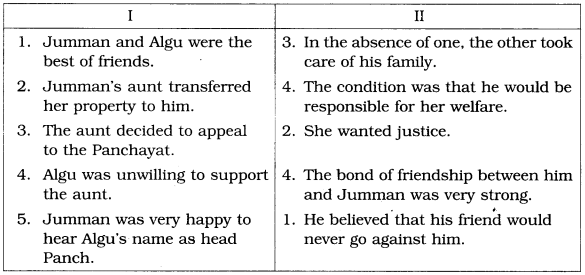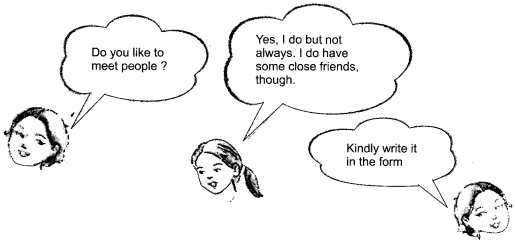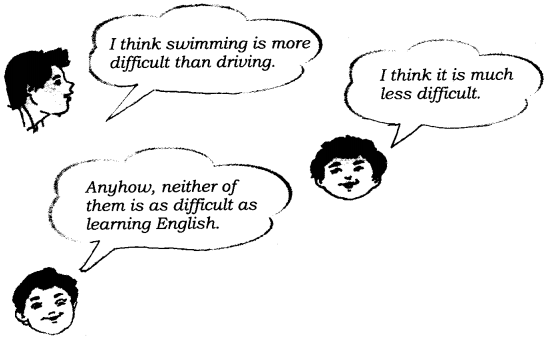NCERT Solutions for Class 6 English Honeysuckle Poem Chapter 8 What if are part of NCERT Solutions for Class 6 English. Here we have given NCERT Solutions for Class 6 English Honeysuckle Poem Chapter 8 What if.
| Board | CBSE |
| Textbook | NCERT |
| Class | Class 6 |
| Subject | English Honeysuckle Poem |
| Chapter | Chapter 8 |
| Chapter Name | What if |
| Number of Questions Solved | 27 |
| Category | NCERT Solutions |
NCERT Solutions for Class 6 English Honeysuckle Poem Chapter 8 What if
Stanzas For Comprehension
Read the following extracts and answer the questions that follow choosing the best option from among the given ones.
1.
Last night, while I lay thinking here,
Some Whatifs crawled inside my ear
And pranced and partied all night long
And sang their same old Whatif song:
Whatif I’m dumb in school ?
Whatif they’ve closed the swimming-pool ?
word-Notes :
Crawled-came, आये। Whatifs-possibilities, संभावनायें। Pranced-capered/danced, नाचते रहे। Partied-caroused, मस्ती करते रहे।
हिन्दी अनुवाद :
पिछली रात जब मैं यहाँ लेटा हुआ सोच रहा था, कुछ ‘क्या होगा अगर’ जैसे प्रश्न मेरे मस्तिष्क में रेंगते हुए आ गये। सारी रात वे नाचते और मस्ती करते रहे और अपना वही पुराना ‘क्या होगा अगर’ को गाना गाते रहे, क्या होगा अगर मैं स्कूल में गूंगा हो जाऊँ ? क्या होगा अगर तरण-ताल बंद हो जाये ?
Paraphrase :
Last night while I lay thinking, some imaginary questions came to my mind. They kept on haunting me all night long and kept on repeating the same old ‘whatifs’ ? Whatif I am dumb at school ? Whatif the swimming pool is closed ?
Multiple Choice Questions.
1.
While the speaker lay thinking, there arose in his mind some questions which were
(a) intelligent
(b) foolish
(c) useless
(d) troublesome
2.
These questions haunted his mind
(a) for an hour
(b) the whole evening
(c) all day
(d) all night
3.
These questions relate to
(a) present
(b) future
(c) past
(d) school
4.
“I’m dumb in school” means that the speaker might
(a) really go dumb in school
(b) not be able to speak to his friends
(c) not be able to answer the teachers’ questions
(d) be absent in school.
5.
The noun form of ‘sang’ is
(a) song
(b) sing
(c) sung
(d) singly
Answers :
- (c) useless
- (d) all night
- (b) future
- (c) not be able to answer the teachers’ questions
- (a) song
2.
Whatif I get beat up ?
Whatif there’s poison in my cup ?
Whatif I start to cry ?
Whatif I get sick and. die ?
Whatif I flunk that test ?
Word-Notes :
Beat up-broken down, निराश। Flunk-fail,असफल होना।
हिन्दी अनुवाद :
क्या होगा अगर मैं पूरी तरह निराश हो जाऊँ ? अगर मेरे कप में जहर हुआ तो ? मैं अचानक चिल्लाने लगूं तो क्या होगा ? अगर मैं बीमार पड़कर मर गया तो ? अगर मैं उस टैस्ट में फेल हो गया तो ?
Paraphrase :
What if I am broken down ? What if there is poison in my cup ? What might happen if I start to cry ? What will happen if I fall sick and die ? What if I fail that test ?
Multiple Choice Questions.
1.
The first possibility in the passage is that the speaker might
(a) be canned
(b) be depressed
(c) beat some one
(d) be beaten by someone.
2.
The questions show that the speaker looks at the future with
(a) fear
(b) hope
(c) dismay
(d) courage.
3.
The speaker does not want to
(a) live
(b) be happy
(c) die
(d) succeed.
4.
The last line shows that the author is probably a
(a) policeman
(b) businessman
(c) teacher
(d) student.
5.
The word ‘flunk’ means the same as
(a) miss
(b) fail
(c) top
(d) succeed.
Answers :
- (b) be depressed
- (a) fear
- (c) die
- (d) student
- (b) fail
3.
fin Whatif green hair grows on my chest ?
Whatif nobody likes me ?
Whatif a bolt of lightning strikes me ?
Whatif I don’t grow taller ?
Whatif my head starts getting smaller ?
Whatif the fish won’t bite ?
Word-Notes :
Bolt-a sudden strike, अचानक पड़ी चोट। Bite-(here) get caught, पकड़ी गयी।
हिन्दी अनुवाद :
अगर मेरी छाती पर हरे बाल उग आयें तो ? क्या होगा अगर मुझे कोई भी पसंद न करे तो ? अगर अचानक ही मेरे ऊपर बिजली गिर गयी तो ? अगर मेरी लंबाई न बढ़ी तो ? अगर मेरा सिर छोटा हो जाये तो ? अगर कोई मछली न फैंसी तो ?
Paraphrase :
What if the green hair grows on my chest ? What might happen if nobody likes me ? If I am struck by lightning, what will happen ? What might happen if my growth stops ? What will happen if my head becomes smaller ? What will happen if I fail to catch the fish ?
Multiple Choice Questions.
1.
The word Whatif indicates that the speaker is
(a) in real danger
(b) thinking of the impossible
(c) under threat
(d) wasting his time and energy
2.
The speaker suffers from
(a) a sense of insecurity
(b) a brilliant imagination
(c) a threat to his life
(d) the fear of lightning
3.
This passage has been taken from
(a) Beauty
(b) Whatif
(c) The Kite
(d) Vocation
4.
The poem has been composed by
(a) Lorraine M. Halli
(b) Harry Behn
(c) Shel Silverstein
(d) Eleanor Farjeon
5.
The word ‘bolt’ means the same as
(a) a lock
(b) a sudden strike
(c) door
(d) a piece of iron
Answers :
- (d) wasting his time and energy
- (a) a sense of insecurity
- (b) Whatif
- (c) Shel Silverstein
- (b) a sudden strike
4.
Whatif the wind tears up my kite ?
Whatif they start a war ?
Whatif my parents get divorced ?
Whatif the bus is late ?
Whatif my teeth don’t grow in straight ?
Whatif I tear my pants ?
Whatif I never leatn to dance ?
Everything seems swell, and then
The night-time Whatif strikes again !
Word-Notes :
Tears-फाड़ती है। Get divorced-leave each other, तलाक लेते हैं। Swell-stylish/first rate,उदात्त/उत्तम।
हिन्दी अनुवाद :
अगर हवा ने मेरी पतंग फाड़ दी तो ? अगर युद्ध छिड़ गया तो ? क्या होगा अगर मेरे माता-पिता में तलाक हो जाये ? अगर बस लेट हो जाये तो ? अगर मेरे दाँत सीधे-सीधे ने उगें तो ? अगर मैं अपनी पैंट फाड़ लें तो ? अगर मैं कभी नृत्य न सीख पाया तो ? हर चीज बड़ी उत्तम लगती है और फिर रात के समय उठने वाले ‘क्या होगा अगर’ के प्रश्न फिर उठ खड़े होते हैं।
Paraphrase :
What will happen if a gust of wind tears my kite ? What might happen if they start a war ? May be my parents get divorced. What shall I do then ? What will I do if the bus is late ? May be my teeth don’t go straight ? What will be the consequence of it ? What might happen if I get my pants tom up ? What will happen if I am unable to learn dancing ? At the moment everything seems first rate. However, these Whatif questions keep on troubling me again and again.
Multiple Choice Questions.
1.
This passage has been taken from the poem
(a) A House, A Home
(b) Whatif
(c) The Quarrel
(d) Beauty
2.
The name of the poet is
(a) Shel Silverstein
(b) R.N. Tagore
(c) Mary O’Neill
(d) Peter Dixon
3.
Who might start a war ?
(a) the speaker’s enemies
(b) terrorists
(c) the foreigners
(d) the peoples of the world
4.
The speaker’s fear was
(a) logical
(b) illogical
(c) necessary
(d) unnecessary
5.
The word ‘swell’ in the passage is
(a) verb
(b) noun
(c) adjective
(d) adverb
Answers :
- (b) Whatif
- (a) Shel Silverstein
- (d) the peoples of the world
- (d) unnecessary
- (c) adjective
Textual Questions
Working with the Poem
Question 1.
- Who is the speaker in the poem ?
- With your partner list out the happenings the speaker is worried about.
- Why do you think she/he has these worries ? Can you think of ways to get rid of such worries ?
Answer :
- It is a child who speaks the poem.
- See the summary (2nd paragraph).
- The child has these worries because of a fearful nature. This fearfulness is a product of the lack of confidence. The best and the easiest way to get rid of these worries is to have faith in God-to believe that God is with you and He takes care of you. The truth is whether one believes it or not, likes it or not, God looks after us and without His mercy life will be impossible.
Question 2.
Read the following line.
Some whatifs crawled inside my ear Can words crawl into your ear ? This is an image The poet is trying to make an image of what she/he experiences. Now with your partner try and list out some more images from the poem.
Answer :
Some other images are :
- And pranced and partied all night long
- And sang their same old whatif song.
- Whatif the wind tears up my kite.
Question 3.
In groups of four discuss some more ’whatifs’ that you experience in your day to day life and list them out.
- …………………………………………………………………………………………………………
- …………………………………………………………………………………………………………
- …………………………………………………………………………………………………………
- …………………………………………………………………………………………………………
- …………………………………………………………………………………………………………
- …………………………………………………………………………………………………………
- …………………………………………………………………………………………………………
- …………………………………………………………………………………………………………
And now write a poem of five or six lines with the ’whatifs’ that you have listed.
Answer :
- Whatif I rise late in the morning ?
- Whatif I miss the school bus ?
- Whatif the teacher does not allow me in the class ?
- Whatif my classmates laugh at me ?
- Whatif my father has an accident ?
- Whatif I fall down at the gate ?
- Whatif my younger brother is in the wrong ?
- Whatif they all laugh at my song ?
I have written the following poem on my whatifs : Whatif I am late to get up ?
Whatif the bus is missed in the set up ?
Whatif I am kept out of class ?
Whatif the friends smile at my loss ?
Whatif I fall down at the gate ?
Whatif my father has an accident ?
Whatif my brother is found in the wrong ?
Whatif they all laugh at my song ?
We hope the NCERT Solutions for Class 6 English Honeysuckle Poem Chapter 8 What if help you. If you have any query regarding NCERT Solutions for Class 6 English Honeysuckle Poem Chapter 8 What if, drop a comment below and we will get back to you at the earliest.











